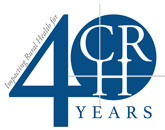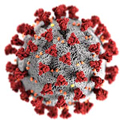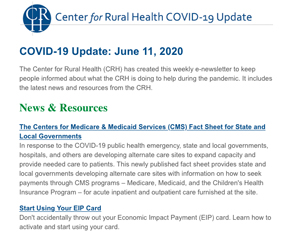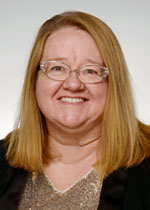CRH Continues Its Mission During COVID-19
By Brenda Haugen on

Just a couple of weeks before the Center for Rural Health (CRH) planned to celebrate its 40th anniversary in April of this year, everything changed. With the COVID-19 pandemic, CRH staff found themselves working remotely and helping others navigate through uncertainty on a scale most have never experienced before.
Perhaps it's fitting that CRH staff are doing what they do best during this anniversary year. Never missing a beat even while setting up workstations in their homes, staff continued the CRH mission to share resources and knowledge to strengthen the health of people in rural communities. In fact, staff members have even increased their efforts, helping rural communities, healthcare facilities, healthcare professionals, and others find their way to the resources they need, including those specifically related to COVID-19.

Along with responding to interview and information requests from numerous media outlets across the country, leaders at the CRH are ensuring that those the CRH serves are staying up to date with the latest information available regarding COVID-19. While the Center for Rural Health Update is a monthly e-newsletter that offers news, resources, and other information related to rural health, CRH leadership felt the pandemic called for something more.

Toward that end, in early April the CRH began publishing the Rural COVID-19 Update (link no longer available), a weekly e-newsletter designed to keep people informed about what the CRH is doing to help during the pandemic. The e-newsletter contains news and resources, events, and funding and other opportunities. Because pandemic news and resources slowed toward the end of June, Rural COVID-19 Update is on hiatus, but if the situation changes, the weekly e-newsletter again will be used as a tool to get pandemic news and resources out to the public more quickly.
Online Resources
Many CRH projects created COVID-19 specific pages to provide resources relevant to their audiences. The Rural Health Information Hub created the Rural Response to COVID-19 issue guide (no longer available online). The web-based issue guide lists guidelines, resources, events, news, and funding opportunities available from federal and state agencies as well as organizations across the country to address COVID-19 in rural communities. In addition, rural communities can share how they are adapting to the pandemic in the Rural COVID-19 Innovations section.
The National Resource Center on Native American Aging also has a COVID-19 Resources webpage (no longer available online). It includes resources offered by its partner organizations, general resources, and guides, fact sheets, and other materials.
The Mountain Plains Mental Health Technology Transfer Center (MHTTC) (no longer available online) provides resources, training, and technical assistance to those who serve people with mental health disorders. During COVID-19, MHTTC has gathered COVID-19 mental health resources (no longer available online), including those designed to help parents, caregivers, and teachers guide children through these difficult times. The MHTTC also has offered a number of webinars related to COVID-19 and mental health issues. Currently, a webinar series on Preventing and Responding to Family Violence During COVID-19 is underway. Upcoming sessions are slated for July 21 and 28 and August 11 (no longer available online).
The Rural Health Research Gateway, which provides access to the research done by the federally funded Rural Health Research Centers (RHRCs) across the country, added a Coronavirus Disease 2019 (COVID-19) topic page to its website. The page highlights research products related to the pandemic completed by RHRC researchers. The National Indigenous Elder Justice Initiative (NIEJI) (no longer available online) also created a COVID-19 Tribal Elder Resources page filled with trustworthy resources for tribal communities.
In addition, on World Elder Abuse Awareness Day in June, NIEJI hosted a video presentation titled Protecting Our Elders During COVID-19. According to Jacque Gray, associate director of CRH Indigenous Programs, she and NIEJI staff have been collecting materials related to COVID-19 throughout the pandemic and have distributed them to Native elders and Title VI workers. Among those materials are COVID-19 and elder abuse resources; information on social distancing; information on food security and nutrition during COVID-19; information on those who may be especially vulnerable to COVID-19; and activities to help older adults stay socially connected.
Flyers on ways to stay connected are going out with meals to elders.
"Flyers on ways to stay connected are going out with meals to elders," Gray said.
Meanwhile, Project ECHO has been helping fill the need for COVID-19 online education.
"I was participating in a National Organization of State Offices of Rural Health COVID-19 Listening Tour call on March 16, and members from other states were sharing what they were doing around addressing COVID-19, and it just made sense to use Project ECHO at the CRH to offer education to North Dakota healthcare workers," said Julie Reiten, Project ECHO coordinator. "The topics were determined based on what seemed most important at the time. Infection prevention and control methods seemed the most pressing thing to start with. After looking at other requests, based off of the feedback from that ECHO, it was decided to focus on provider well-being next because mental health concerns were mentioned frequently."
Project ECHO also has held clinics on COVID-19 in nursing homes and telehealth policy updates related to COVID-19. The slides and videos for all four events can be found on the Project ECHO webpage.
Helping Healthcare Facilities and Workers
Beyond offering online education, the CRH is helping healthcare facilities and workers in other ways as well. Angie Lockwood is the project coordinator for the Small Rural Hospital Improvement Program (SHIP), which offers grants to help small rural hospitals. The CRH was awarded more than $3 million in federal aid last spring through the Health Resources and Services Administration's SHIP program to provide funding to North Dakota Critical Access Hospitals to prevent, prepare for, and respond to coronavirus.
We've been working with our rural hospitals and sharing information as it is made available.
"We've been working with our rural hospitals and sharing information as it is made available," Lockwood said. "We're providing technical assistance on use of the dollars and will be assisting them with additional resources to help with the complexities of understanding, tracking, managing, and reporting on this funding."
Workforce Specialist Stacy Kusler also has been helping healthcare facilities. Under the workforce grant, Kusler is helping rural communities alter their recruitment practices while in-person interviews and site visits aren't possible. She also works with the state's J-1 Visa Waiver program, which waives the two-year residency requirement and lets doctors remain in the U.S. if they work in a federally designated Health Professional Shortage Area or Medically Underserved Area.
"J-1 physicians make up a significant portion of our healthcare workforce in the state," Kusler said. "Although there are challenges based on the latest executive order regarding immigration, J-1 physicians already in the U.S. are considered exempt, and we will continue to move forward with our J-1 Visa Waiver program this year as usual."
Kusler also serves as the principal investigator for the North Dakota Primary Care Office.
"The work this project is doing to help with COVID response is supporting healthcare facilities that may have providers under loan repayment obligation," she said. "If their hours are being cut, this is causing some of them to enter into loan repayment default. We are working with them on their situation, as well as communicating with federal programs to understand any emergency clauses that are in place to help navigate these situations."
Reaching People Where They Are
In June, the Rural Recruitment Reimagined Workshop (RRRW) went virtual with great success. The workshop, geared toward hospital and healthcare leadership, community leaders, and recruitment staff, challenged people to look at rural recruitment in new ways. Among the day's events was a panel of family practice faculty and residents who shared what they look for in practice opportunities and guest speaker Benjamin Anderson who shared his tale of recruitment success in a small town.
Even though this virus is affecting everyone, recruitment doesn't stop.
"Even though this virus is affecting everyone, recruitment doesn't stop," Kusler said. "The RRRW was well received among attendees. Our North Dakota facilities rarely have an opportunity to hear from millennial physicians just entering the workforce. The feedback was pretty much unanimous that this workshop helped them to consider recruitment to rural areas in a different way."
The North Dakota Brain Injury Network (NDBIN) has gone virtual as well, offering online support groups for brain injury survivors, providers, and caregivers. The first NDBIN Zoom support group met March 30.

"Out of those who attended, most said they would like to have it monthly and really appreciated it," said NDBIN Director Rebecca Quinn.
Virtual opportunities such as these also have had some unexpected pluses. In some cases, CRH programs are able to reach people virtually who weren't able to participate for various reasons in the past.
"We did have one individual who lives on a farm, and he said that for him, it is providing an option to participate that he had not had before," Quinn said of the virtual support group.
This article appeared in the Fall 2020 issue of North Dakota Medicine.


 was a communications specialist at the Center for Rural Health at the University of North Dakota School of Medicine & Health Sciences in Grand Forks.
was a communications specialist at the Center for Rural Health at the University of North Dakota School of Medicine & Health Sciences in Grand Forks.



